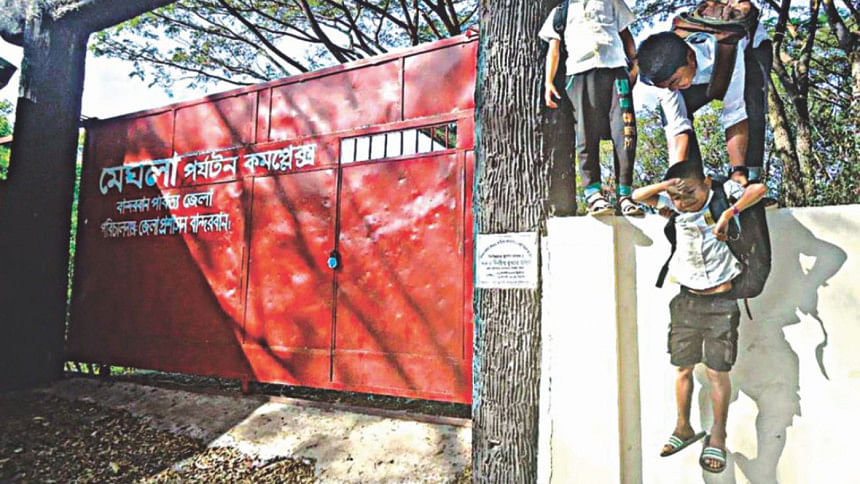Jumping to conclusions in poignant encounters

You never know until they tell you. We humans have been perennially judging each other by appearances mainly, but also by what we say or do or not.
Curious, but none of my business—I still had to ask this Bangalee girl in her twenties why her supposedly beautiful black hair was dyed blonde. Since she was born, brought up and residing in the UK, I wondered in self-misery whether she had forsaken her Bangladeshi roots in vainly trying to earn a few points with her English friends.
"You would look so lovely in black," I said, trying to neutralise what sounded like a judgemental observation laced with pity.
She was unperturbed and seemed to have heard jerks like me more than once.
She has a form of cancer, external as it was, she explained most kindly to a person she understood to be health illiterate. My heart sank to my feet and my lips began to dry. The ailment, she went on with extreme politeness, bleached the skin on the back of her neck, contrasting with her dark hair. She elaborated that she faced more questions about the patch on her neck, and hence her choice to decolourise her mane. We discussed everything else for the rest of the evening. When shall we learn to mind our own business? I learnt quite a bit.
At a suburban school in a relatively poor neighbourhood, a Class VII teacher took note of the peculiarity that the two brothers admitted to his class were never ever present together for lessons. He let it pass for a few days. As time went on, he was increasingly being worked up by the boys' alternating play of truant. Their rotating presence in class was downright insulting because they were deliberately deceiving their teacher.
Driven to the edge of his patience, one day he confronted the brother who happened to be present.
"You boy," he asked rather raucously, "why don't you two brothers ever come to class together?"
"Sir..."
"Do you think I do not understand anything?"
"Sir..."
"Tell me, what's your problem? And it better be good."
The child's voice was now even lower.
"Sir ... between the two of us we have only one pair of trousers."
The teacher silently pledged to do something about it, but outwardly only tousled the child's hair.
A gentleman, in offering his greetings to another likewise, extended his right hand to commence a routine handshake as a gesture of goodwill and fellowship. He was rather taken aback when in return he was offered his counterpart's left hand.
Reeling from amazement, catalysed by his mental conclusion that the other entity was impolite, more so because his right hand was obscured from view by the shadows dancing in the afternoon sunlight:
"What's the problem? Why are you giving me your left?"
"I don't have a right hand," the man was apologetic; "I lost it in 1971".
Himself a decorated Freedom Fighter, the man embraced the other as a comrade does another. He did not have to say "sorry". That would sound so lame. You cannot apologise to a Gazi for losing an arm for his country. Then again, you never ask a blind man whether he can see.
A developer company has a logo with lots of green colour. It has printed a project brochure showing its proposed building in the midst of immense greenery, blue cascading sky in the backdrop, and children running towards a not-too-distant water body. No, the building is not coming up in any haor elaka. Not many consumers are willing to buy that amount of seclusion for any amount of money. The development is taking place in congested Badda, where the best bet to find greenery is on cultivated rooftop gardens, if at all, or a well-nurtured flowerpot.
Developers have the liberty to indulge in fake advertising, peddling ghol but promising doi. Some of their pamphlets show 3Ds of living rooms where children can ride a bicycle, but in reality the space can barely fit a sofa set. Their luxurious bedrooms are one-bed-long. One can stand in their veranda, but not sit. The neighbouring buildings are but a handshake away, but their catalogues show clouds passing in between.
It is advisable not to jump to ecstasy by believing the printed matter. Punters should visit the proposed site with a readiness not to be too dismayed if it is under water or three metres below road level. Seeing is believing!
You would jump to the conclusion that a gate was for entering and exiting a bounded area. However, by remaining always shut, it belies the conclusion met by one's eyes. The matter in Bandarban becomes more heartrending because the case in point involves children.
A report in The Daily Star on February 2, titled "The gate of grief", read that the entrance to the Meghla Parjatan Complex in Bandarban remains closed most of the time, which pretty well sums up the efforts of the concerned authorities to boost tourism in the district. Tourists are obviously not being served by this "second" gate. Another main gate remains open for those who want to visit the hanging bridge and zoo inside.
Nearly two years ago, the Bandarban district administration built the gate, and locked it. Recently, it locked too the pocket gate, adding pain to the hard life in the hills. For decades, villagers of two indigenous neighbourhoods commuted on a road, now shut by a gate. This bizarre preventative action is also denying schoolchildren access to and from their school, twice a day.
Children happily scale the wall adjacent to the closed gate, and the more able ones help the smaller kids. For them, it is a matter of necessity, even fun in a way perhaps. The gate is however denying the villagers their decades-old "right of way", and that is against the norm.
Only the decision-maker, being a government employee, knows for sure whether any legal framework has been violated. Every day the villagers encounter an office order that has transformed a well-meaning gate into a wall.
Let us not judge by what the eyes behold, even it be beauty, for underneath a flimsy cover, deliberate or otherwise, lies the rude truth.
Dr Nizamuddin Ahmed is a practising architect, a Commonwealth Scholar and a Fellow, a Baden-Powell Fellow Scout Leader, and a Major Donor Rotarian.

 For all latest news, follow The Daily Star's Google News channel.
For all latest news, follow The Daily Star's Google News channel. 



Comments